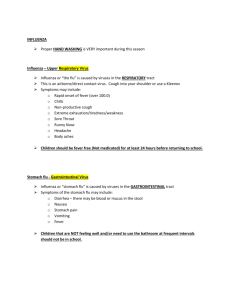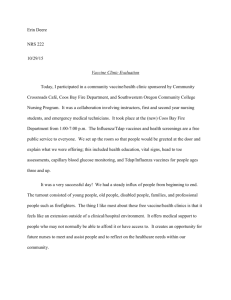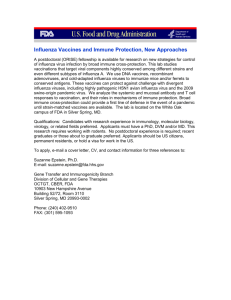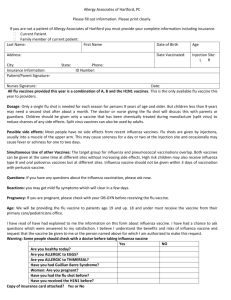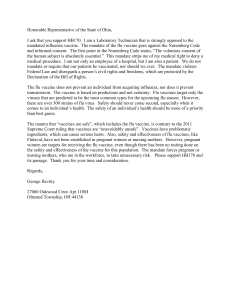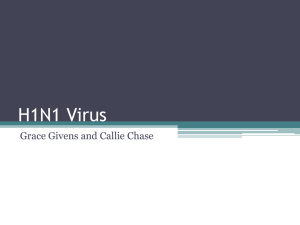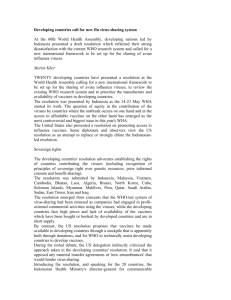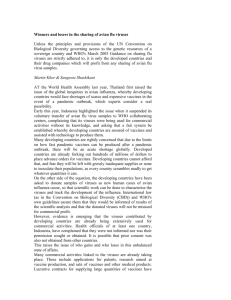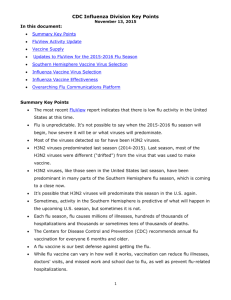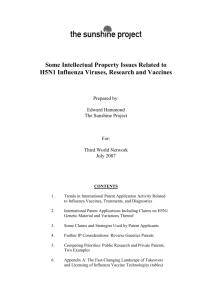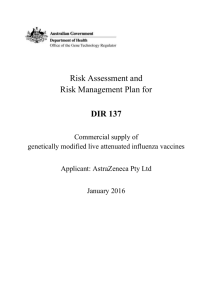SEEK announces successful Phase II challenge study of its
advertisement
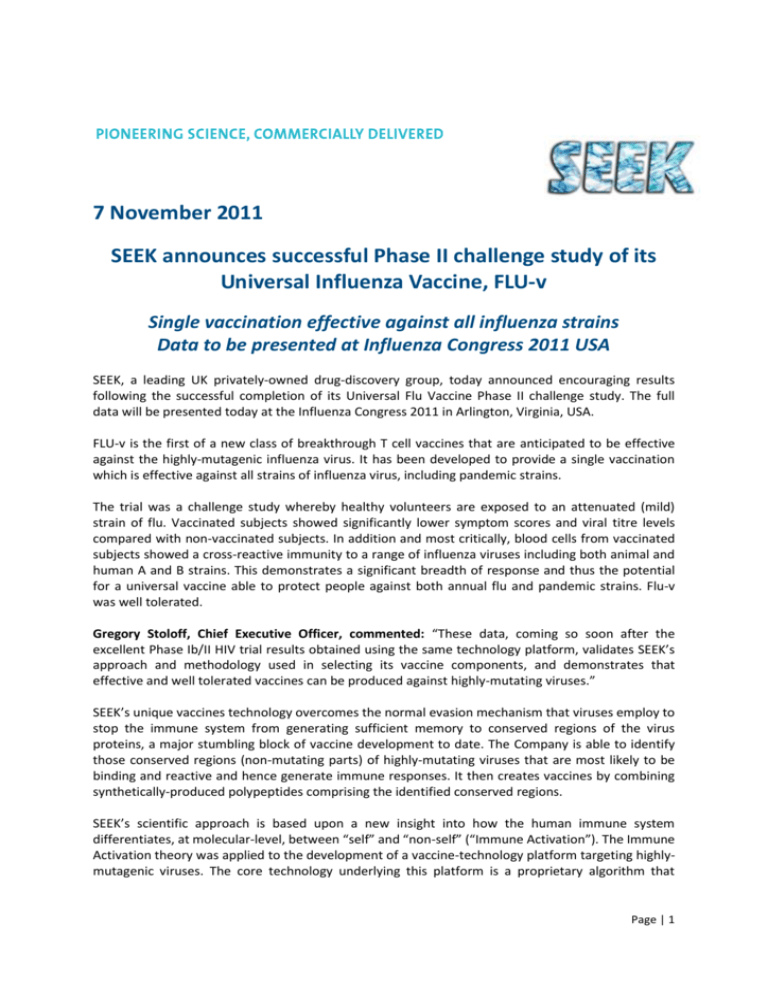
7 November 2011 SEEK announces successful Phase II challenge study of its Universal Influenza Vaccine, FLU-v Single vaccination effective against all influenza strains Data to be presented at Influenza Congress 2011 USA SEEK, a leading UK privately-owned drug-discovery group, today announced encouraging results following the successful completion of its Universal Flu Vaccine Phase II challenge study. The full data will be presented today at the Influenza Congress 2011 in Arlington, Virginia, USA. FLU-v is the first of a new class of breakthrough T cell vaccines that are anticipated to be effective against the highly-mutagenic influenza virus. It has been developed to provide a single vaccination which is effective against all strains of influenza virus, including pandemic strains. The trial was a challenge study whereby healthy volunteers are exposed to an attenuated (mild) strain of flu. Vaccinated subjects showed significantly lower symptom scores and viral titre levels compared with non-vaccinated subjects. In addition and most critically, blood cells from vaccinated subjects showed a cross-reactive immunity to a range of influenza viruses including both animal and human A and B strains. This demonstrates a significant breadth of response and thus the potential for a universal vaccine able to protect people against both annual flu and pandemic strains. Flu-v was well tolerated. Gregory Stoloff, Chief Executive Officer, commented: “These data, coming so soon after the excellent Phase Ib/II HIV trial results obtained using the same technology platform, validates SEEK’s approach and methodology used in selecting its vaccine components, and demonstrates that effective and well tolerated vaccines can be produced against highly-mutating viruses.” SEEK’s unique vaccines technology overcomes the normal evasion mechanism that viruses employ to stop the immune system from generating sufficient memory to conserved regions of the virus proteins, a major stumbling block of vaccine development to date. The Company is able to identify those conserved regions (non-mutating parts) of highly-mutating viruses that are most likely to be binding and reactive and hence generate immune responses. It then creates vaccines by combining synthetically-produced polypeptides comprising the identified conserved regions. SEEK’s scientific approach is based upon a new insight into how the human immune system differentiates, at molecular-level, between “self” and “non-self” (“Immune Activation”). The Immune Activation theory was applied to the development of a vaccine-technology platform targeting highlymutagenic viruses. The core technology underlying this platform is a proprietary algorithm that Page | 1 predicts the propensity of parts of proteins to bind to molecules on cells and react with immune cells, enabling SEEK to identify those conserved regions. SEEK’s Universal Flu vaccine could be available for use, subject to regulatory approval, in the next 35 years. About the Trial The randomised double-blind trial was conducted by Retroscreen Virology Limited in 28 male volunteers, aged between 18 and 40 years, receiving a single vaccine of 500 micrograms in adjuvant or no vaccination, followed 21 days later by a challenge with an H3N2 A Wisconsin influenza virus. The development of symptoms and viral infection was then observed for the following 8 days. Professor John Oxford Scientific Director of Retroscreen Virology Ltd., and Professor of Virology at St Bartholomew’s and the Royal London Hospital, Queen Mary’s School of Medicine and Dentistry commented: “As far as I am aware, this vaccine is the only late-stage vaccine development candidate that is synthetically manufactured and not DNA-based or requiring vector delivery. This vaccine clearly has a biological effect worthy of further investigation, particularly with respect to the broadness of the response.” About Flu Flu is a common human disease that spreads around the world in seasonal epidemics and affects 5 to 15% of the population annually. These epidemics are thought to result in between 3 and 5 million cases of severe illness and between 250,000 and 500,000 deaths every year. The current viruses causing this disease are divided into two groups, A and B, and these can be further subdivided by their surface antigen components. Major mutations in the antigen components of the virus can result in global pandemics, such as the outbreak of “Spanish flu” in 1918-1919, “Asian influenza” in 1957, “Hong Kong influenza” in 1968 and the H1N1 pandemic in 2010. There is also current concern about the potential transmission of an avian A (H5N1) strain to humans. However, even minor genetic changes require the annual reformulation of currently-used vaccines and re-inoculation of at-risk individuals. There is therefore a significant need for a flu vaccine that will be protective against a range of strains of the virus and which can confer long-term immunity. SEEK’s vaccine is designed to protect against both type A and B viruses, as well as antigenic drift within each virus type. - ENDS For more information about SEEK please contact: SEEK Gregory Stoloff, Chief Executive Officer - Tel +44 (0)20 7153 6570 M:Communications Mary Clark / Amber Bielecka / Hollie Vile - Tel +44 (0)20 7920 2330 seek@mcomgroup.com Page | 2 Influenza Congress, USA 2011 Dr. Wilson Caparros-Wanderley, Chief Scientific Officer of SEEK will present further data on the Phase II trial at the Influenza Congress, USA 2011, November 8-10 in Arlington, Virginia. About Seek Founded in 2004, SEEK - previously known as PepTcell - is privately-owned and funded, with headquarters in London, UK. Using a pioneering scientific and commercially-driven approach, SEEK aims to create breakthrough medicines which address major diseases in order to radically improve human health. SEEK’s strategy is to take promising molecules through the challenging stages of discovery to late-stage human proof-of-principle and then to seek partners to take the molecules through the final stages of development and ultimately commercialisation. SEEK’s current productdevelopment areas are vaccines, inflammation/autoimmune diseases, transplantation tolerance induction, respiratory diseases, cancer and diabetes/obesity. Page | 3
